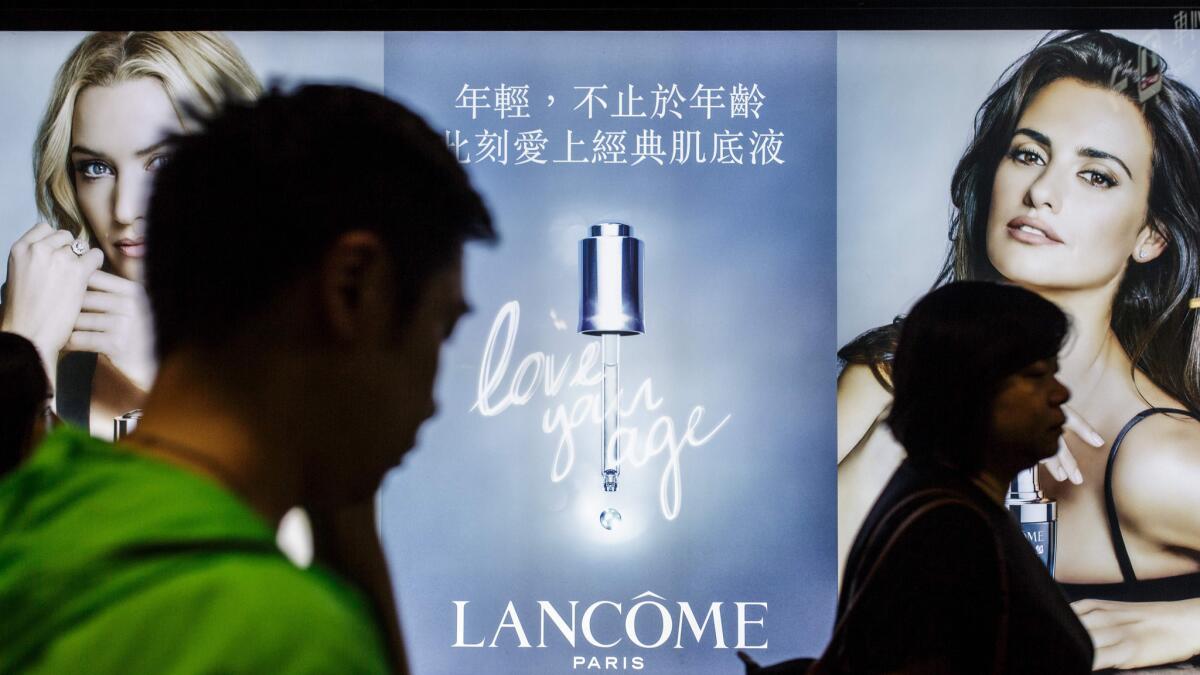Lancome draws outrage in Hong Kong after dropping pro-democracy pop singer

- Share via
Reporting from Beijing — This weekend, the cosmetics brand Lancome faced a dilemma involving two major international markets: It could alienate its customers in mainland China, or alienate its customers in Hong Kong.
Lancome went with alienating Hong Kong.
It all started with a concert. The brand had scheduled a free promotional event in Hong Kong featuring a performance by the Hong Kong-based Cantopop singer Denise Ho, an openly lesbian, outspoken pro-democracy advocate. Then on Saturday, the Beijing-based, Communist party-run newspaper Global Times attacked Ho’s liberal politics — it called her a “Hong Kong and Tibet independence advocate” in a microblog post — causing Chinese Internet users to call for a boycott of its products.
On Sunday night, Lancome canceled the event.
The move comes amid a major push by China’s Communist party to silence its critics abroad. Over the last year, pressure from Beijing has forced a South Korean theater to cancel a show by adherents of Falun Gong, a spiritual group which is banned in China. A crackdown on Hong Kong’s political publishing industry, marked by the apparent extraterritorial abductions of several booksellers, has cast a chill over the city’s once-fiery public sphere.
Foreign artists who have voiced support for the Dalai Lama — most recently Bon Jovi and Maroon 5 — have been barred from performing on the mainland. (Beijing reviles the Tibetan spiritual leader as a “separatist.”)
Lancome, in a statement on Sunday afternoon, emphasized that Ho was not its spokesperson, and in a separate statement, added that it decided to cancel the event “due to possible safety reasons.” (Listerine was a co-sponsor of the event; that company has not issued a statement.)
Ho, 39, shot back on Facebook with a statement of her own. “Lancome’s decision is misleading to the public, and damaging to my reputation,” she wrote.
“Hong Kongers have always pursued freedom, fairness and equality,” she continued. “If we are punished for pursuing these, this is not a problem with me [personally], but a severe distortion of the world’s values. Lancome is an international brand. When an international brand yields to this [kind of] bullying, we need to confront the problem.”
She said that Lancome “unilaterally terminated the contract for no reason at all,” and urged the brand to further explain the cancellation.
Lancome’s parent company L’Oreal looks to China as one of its fastest-growing Asian markets. “The Asia, Pacific Zone is performing well, with a good outcome in China,” said the company’s 2015 annual results. The results also noted a “difficult market in Hong Kong”.
Lancome’s Facebook page has since been flooded with angry posts by spurned Hong Kong residents. One recent post about “rainbow-hued lashes” attracted more than 200 comments, most of them politically charged. Some urged a Lancome boycott in the city.
“Ms Ho was blacklisted by Chinese Communist Party and hated by radical Chinese netizens just because of her pro-democracy stance,” wrote one user. “Lancome’s action to distance itself from her showed that Lancome had yielded to the threat of CCP’s dictatorship.”
Ho ranks among Hong Kong’s most politically outspoken celebrities; she was arrested during the pro-democracy Umbrella Movement protests of 2014. “Students are fighting for genuine democracy, which is what Hong Kong has been fighting for many years for,” she told the South China Morning Post newspaper at the time.
On Ho’s 39th birthday last month, she met the Dalai Lama; afterwards, she posted to Facebook that he was a “sublime Venerable” and “a loving grandpa.”
Chinese authorities have blacklisted several other Hong Kong artists and performers — Anthony Wong Yiu-ming, Ellen Loo, Anthony Wong Chau-sang, Chapman To — for voicing solidarity with pro-democracy protesters.
Yingzhi Yang in the Times’ Beijing bureau contributed to this report
More to Read
Sign up for Essential California
The most important California stories and recommendations in your inbox every morning.
You may occasionally receive promotional content from the Los Angeles Times.










